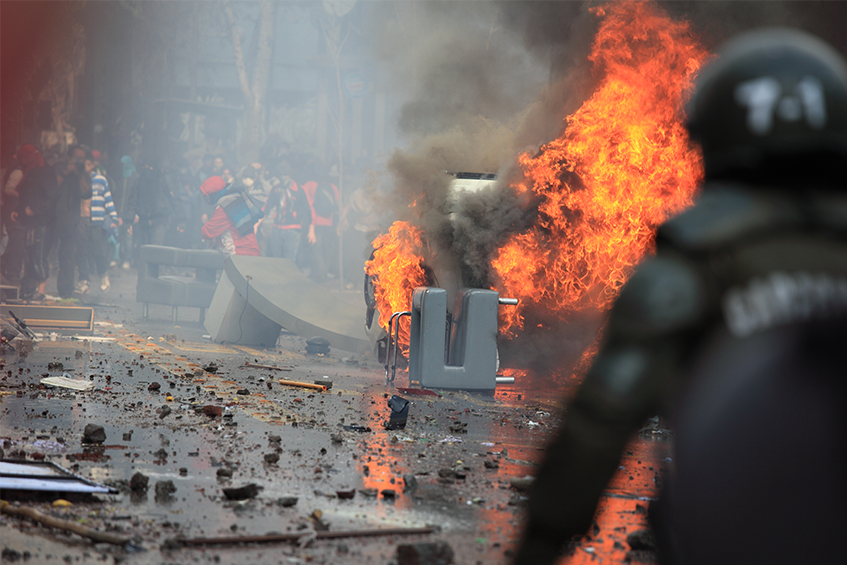With the reshaping of the world order, the rise of (geo)political risk and the climate emergency, political risk is back in the spotlight, with its inevitable economic impact on world trade and businesses. How can we protect ourselves effectively? We take a closer look at this ever-more closely monitored risk.
What is political risk?
Measuring political risk means assessing a country's political stability. Political risk can be of a political, social, security or climatic nature (see below). It can also involve a political decision that prevents a transaction from running smoothly:
- blocking a transfer of assets;
- confiscation of investments or property;
- refusal by a public authority to meet its obligations;
- economic embargoes or sanctions;
- nationalisation;
- expropriation
These upheavals can have an impact on companies, financial institutions, banks and investors. For any company, whatever its size, the political instability of a country can have a significant impact on its business or the markets in which it operates.
Along with payment default, political risk is a component of Single Risk solution: the coverage of an individual medium-term, non-cancellable credit risk.
Global trade: 4 major political risks
1. Government interference
In the event of a political crisis or government change, the government in charge may decide to confiscate companies' investments. This is the case, for example, when a new political party comes to power and seeks to nationalise industries, often without fair compensation for the companies concerned. These expropriation measures result in the loss of assets or investments for the companies concerned.
2. War, civil unrest and terrorist attacks
When war breaks out, riots occur or a terrorist attack takes place, a company's business can be affected in many ways:
- Destruction or closure of premises.
- Damage to or loss of assets (property and financial)
- Inability to continue its activities.
Some companies may even be specifically targeted if they are considered to be "political enemies". This type of incident causes serious cash flow issues for companies, with the risk of non-payment to business partners.
The economic impact of a war differs significantly from one company to another, depending in particular on its exposure and that of the countries concerned to soaring commodity prices. In a climate of geopolitical tension, companies see their financing costs rise without necessarily being able to pass on this increase in their selling prices.
3. Embargoes and sanctions
Do you trade with a country that is under a trade embargo or sanctions? Beware: your imports and/or exports could quickly be restricted. These measures, which represent the political risk you are most likely to face, are generally implemented very quickly. If your partner is sanctioned, you could suffer substantial losses, even if your business relationship began long before the situation deteriorated.
In such a situation, you need to be (well) protected... and able to anticipate such risks!
"As a world leader in trade credit insurance and risk management, our key asset is our ability to adjust our underwriting in line with the political and geopolitical risks we face. Thanks to our unique expertise and close collaboration with our clients, we can anticipate and effectively protect them against the country risks involved in their activities"
emphasises Benjamin LAMBERT, Head of Political and Credit Risk and Deputy Director of Single Risk at Coface.
4. Climate risks
The increasing forecasts for the future of the Earth mean that environmental criteria play a much greater role in the assessment of political risks. In this respect, companies are exposed to two major risks:
- physical risk (frequency of exceptional climatic events);
- transition risk (effects of government measures on companies).
By combining exposure* and sensitivity** indexes, Coface assesses a country's vulnerability to climatic risks, based on six sectors that are essential for a country to function properly: food, access to water, health system, ecosystem services, human habitat and infrastructure.
How are these risks detected?
To determine the country risk, Coface's expert economists analyse macro-economic, financial and political data. A total of 160 countries are assessed all year long. Because it is essential that this information is always up to date, Coface produces its Country & Sector Risk Barometer every quarter, to enable each of its clients and partners to take the pulse of the latest developments in the countries in which they operate.
In addition, Coface delivers a specific score for political and social risk. This is based on socio-economic indicators specific to each country and calculated by analysing the interaction of global economic factors with local events (political, social, environmental) specific to each country. For the year 2023, the Coface index scores show higher risk levels than before the pandemic (see our article Social & Political Risk: what to expect in 2024).
"After more than 70 years of peace, political risk has been back in the forefront, in various forms, and has punctuated the agenda of many countries in recent years. These risks are clearly on the increase, notably due to the reshaping of the world order and the climate emergency, two major sources of uncertainty and instability for the years to come"
Ruben NIZARD, North America Economist and Head of Political Risk at Coface.
Companies & country risks: how can companies be protected?
Sales, purchase or import contracts, financing or investments: are you an SME, ETI, large group or financial institution looking to secure your operations? Trade credit insurance is one of the best solutions for protecting against political risk.
If the country in or with which your business partner is trading is experiencing political unrest, it will most likely be impossible for him to honour his commitments, leading to non-payment and bad debts for your company. These situations weaken your cash flow and can even lead to insolvency. Coface's trade credit insurance is not just a protective policy: it also includes a prevention aspect, to assess your commercial partners (customers, suppliers) and your markets in advance, before any business relationship.
Coface's Single Risk solutions support you with tailor-made, medium and long-term cover to protect you against the risk of non-payment, including those linked to political and commercial risks (payment defaults). At Coface, Single Risk guarantees are subject to a specific methodology, applied by a tightly-knit team of expert risk underwriters and economists.
As a world leader in risk management for over 75 years, Coface helps companies to protect themselves against non-payment so that they can develop with complete confidence. Contact our experts to find the trade credit insurance solution that fits your needs, or to receive a credit advice tailored to your requirements.
* Exposure index: a measure of a country's vulnerability to climate disruption. This index captures the physical impact of climate risk.
**Sensitivity index: assessment of the degree of impact of a climatic shock based on topographical variables, demographics or the country's economic structure.





